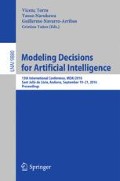Abstract
IFPD confirmation measures are used in ranking inductive rules in Data Mining. Many measures of this kind have been defined in literature. We show how some of them are related to each other via weighted means. The special structure of IFPD measures allows to define also new monotonicity and symmetry properties which appear quite natural in such context. We also suggest a way to measure the degree of symmetry of IFPD confirmation measures.
Access this chapter
Tax calculation will be finalised at checkout
Purchases are for personal use only
Notes
- 1.
As a matter of fact, when the evidence E disconfirms conclusion H, i.e. \(P(H|E)<P(H)\), both \(Z_1\) and \(Z_2\) assume a negative value: strictly speaking their harmonic mean is not defined, but the proposed link (1) among measures holds, with the same meaning. In the neutrality case we have the boundary values \(K=Z=0\) and their link cannot be defined by a harmonic mean like (1).
References
Atkinson, D.: Confirmation and justification. A commentary on Shogenji’s measure. Synthese 184, 49–61 (2012)
Błaszczyński, J., Greco, S., Matarazzo, B., Słowiński, R.: jMAF - dominance-based rough set data analysis framework. In: Skowron, A., Suraj, Z. (eds.) Rough Sets and Intelligent Systems - Professor Zdzisław Pawlak in Memoriam. ISRL, vol. 42, pp. 185–209. Springer, Heidelberg (2013)
Carnap, R.: Logical Foundations of Probability, 2nd edn. University of Chicago Press, Chicago (1962)
Crupi, V., Festa, R., Buttasi, C.: Towards a grammar of Bayesian confirmation. In: Suárez, M., Dorato, M., Rédei, M. (eds.) Epistemology and Methodology of Science, pp. 73–93. Springer, Dordrecht (2010)
Eells, E., Fitelson, B.: Symmetries and asymmetries in evidentual support. Philos. Stud. 107, 129–142 (2002)
Fitelson, B.: The plurality of Bayesian measures of confirmation and the problem of measure sensitivity. Philos. Sci. 66, 362–378 (1999)
Fitelson, B.: Likelihoodism, Bayesianism, and relational confirmation. Synthese 156, 473–489 (2007)
Geng, L., Hamilton, H.J.: Interestingness measures for data mining: a survey. ACM Comput. Surv. 38, 1–32 (2006)
Glass, D.H.: Entailment and symmetry in confirmation measures of interestingness. Inf. Sci. 279, 552–559 (2014)
Good, I.J.: Probability and the Weighing of Evidence. Charles Griffin, London (1950)
Grabisch, M., Marichal, J.-L., Mesiar, R., Pap, E.: Aggregation Functions. Cambridge University Press, Cambridge (2009)
Greco, S., Pawlak, Z., Słowiński, R.: Can Bayesian confirmation measures be useful for rough set decision rules? Eng. Appl. Artif. Intell. 17, 345–361 (2004)
Greco, S., Słowiński, R., Szczȩch, I.: Properties of rule interestingness measures and alternative approaches to normalization of measures. Inf. Sci. 216, 1–16 (2012)
Kemeny, J., Oppenheim, P.: Degrees of factual support. Philos. Sci. 19, 307–324 (1952)
Laboratory of Intelligent Decision Support Systems of the Poznan University of Technology. http://idss.cs.put.poznan.pl/site/software.html
Piatetsky-Shapiro, G.: Discovery, Analysis, and Presentation of Strong Rules, pp. 229–248. AAAI/MIT Press, Cambridge (1991)
Rescher, N.: A theory of evidence. Philos. Sci. 25, 83–94 (1958)
Shogenji, T.: The degree of epistemic justification and the conjunction fallacy. Synthese 184, 29–48 (2012)
Siburg, K.F., Stoimenov, P.A.: Symmetry of functions and exchangeability of random variables. Stat. Pap. 52, 1–15 (2011)
Susmaga, R., Szczech, I.: The property of \(\chi ^2_{01}\)-concordance for Bayesian confirmation measures. In: Torra, V., Narukawa, Y., Navarro-Arribas, G., Megías, D. (eds.) MDAI 2013. LNCS, vol. 8234, pp. 226–236. Springer, Heidelberg (2013)
Susmaga, R., Szczȩch, I.: Can interestingness measures be usefully visualized? Int. J. Appl. Math. Comput. Sci. 25, 323–336 (2015)
Wu, X., Zhang, C., Zhang, S.: Efficient mining of both positive and negative association rules. ACM Trans. Inf. Syst. 22, 381–405 (2004)
Author information
Authors and Affiliations
Corresponding author
Editor information
Editors and Affiliations
Rights and permissions
Copyright information
© 2016 Springer International Publishing Switzerland
About this paper
Cite this paper
Celotto, E., Ellero, A., Ferretti, P. (2016). Monotonicity and Symmetry of IFPD Bayesian Confirmation Measures. In: Torra, V., Narukawa, Y., Navarro-Arribas, G., Yañez, C. (eds) Modeling Decisions for Artificial Intelligence. MDAI 2016. Lecture Notes in Computer Science(), vol 9880. Springer, Cham. https://doi.org/10.1007/978-3-319-45656-0_10
Download citation
DOI: https://doi.org/10.1007/978-3-319-45656-0_10
Published:
Publisher Name: Springer, Cham
Print ISBN: 978-3-319-45655-3
Online ISBN: 978-3-319-45656-0
eBook Packages: Computer ScienceComputer Science (R0)

